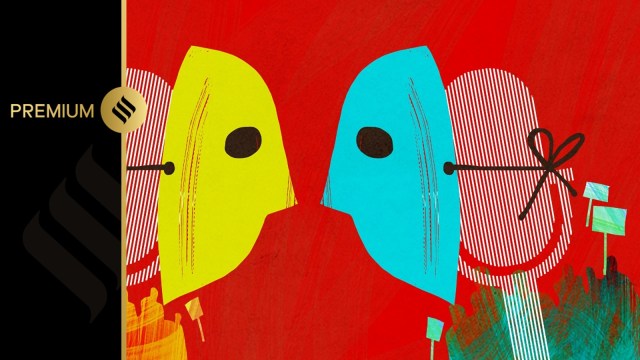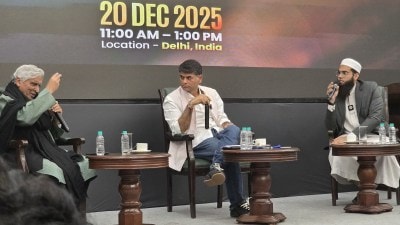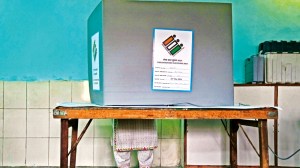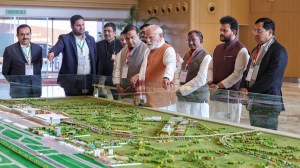A conference organised in January by a wing of the ruling DMK in Tamil Nadu had a surprising guest appearance by Dravidian icon M Karunanidhi, who appeared on a big screen in his trademark black sunglasses, white shirt and a yellow shawl. Karunanidhi praised the current leadership in the state under his son M K Stalin. Except, Karunanidhi died in 2018.
As the battleground for the Lok Sabha polls heats up, political parties find a new weapon in their arsenal: sharing content on social media platforms such as Facebook, Instagram, YouTube and X that are generated through artificial intelligence (AI) to either promote their own candidates or ridicule opponents and send targeted personalised messages to voters.

Experts believe AI will be used on an unprecedented scale this election – and potentially be a deciding factor like social media was in the 2014 polls – though the impact of the disruptive technology in moulding voters’ opinion remains to be seen.
Since the beginning of this year, political parties, including the BJP and Congress, have shared content altered through AI on at least four occasions on their official Instagram handles. The themes of these manipulated media – called deepfakes in common parlance – are similar: project leaders of rival parties in poor light.
📌 On March 16, the BJP shared a deepfake of Rahul Gandhi on Instagram with the Congress leader seemingly uttering the words: “I don’t do anything.”
The BJP recently released another manipulated video in which AI was used to recreate the voices of Opposition leaders Mamata Banerjee, Arvind Kejriwal and Akhilesh Yadav, among others.
📌 Earlier, the Congress’s official Instagram handle shared a deepfake with Prime Minister Narendra Modi’s face superimposed onto that of Justh, the singer of a popular song titled Chor (thief). The vocals were altered through AI to closely resemble Modi’s voice. Most recently, the Congress handle shared an altered picture of PM Modi facing a poster of a woman wrestler in tears.
Story continues below this ad
📌 In February, the official handle of the AIADMK, Tamil Nadu’s main Opposition party, shared a voice message by party stalwart J Jayalalithaa in which she urges people to support its current leader Edappadi Palaniswami. Jayalalithaa died in 2016.
📌 Ahead of the Assembly elections in Telangana last year, the official X handle of the Telangana Congress shared a deepfake of BRS leader KT Rama Rao purportedly urging the public to vote against his party.
Voice cloning and a personalised touch
Voice clones of candidates, generated by AI, are expected to be used by political parties for targeted messaging to woo voters.
“We are all aware of call blasts containing a pre-recorded message from candidates urging you to vote for them. But with AI, you can now also make the candidate address you by name at the beginning of the call. That adds a new dimension to the level of personalisation that a candidate can offer during their outreach campaign,” said a politician who is contesting this year’s election.
Story continues below this ad
Parties have reached out to political consulting companies to explore how they can achieve this.
Divyendra Singh Jadoun runs one such company. Founder of the Ajmer-based AI services company, Polymath Solution, Jadoun, who also runs a popular Instagram handle called The Indian Deepfaker, told The Indian Express, “A number of political parties are interested in exploring options around personalised conversational AI where a candidate’s voice can be recreated through AI with the added level of personalisation being added by these candidates seemingly addressing the voters by their individual names,” Jadoun told this paper. “We are in touch with multiple parties who are exploring this and some of this should start getting deployed towards the first week of April.”
A detailed questionnaire that The Indian Express sent to the Election Commission of India, asking whether it had taken cognisance of parties sharing deepfakes through their official handles and if it was going to issue a directive to place guardrails around the use of AI in campaigning, remained unanswered.
The model code of conduct, which has kicked in with the announcement of the poll dates, is silent on political parties using AI-generated content for campaigning.
Story continues below this ad
Calls to rein in AI
Experts have sounded caution against the potential use of AI-generated content to sway voter perception, and have called on the Election Commission to step up its efforts to deal with the use of this technology.
“A few hours are enough for such things to go viral and by the time you detect them, the damage would have already been done. Platforms do not have real-time monitoring systems, and until that happens, it will be very difficult to contain such content,” Anil Verma, head of the Association for Democratic Reforms (ADR) and National Election Watch, told The Indian Express.
“Companies have spoken of introducing technologies like labelling and watermarking AI-generated videos. But with the size of our population, and the political parties using WhatsApp to push this kind of content, it will be very difficult,” he added.
The challenge has also forced tech companies – the biggest platforms to disseminate AI-generated content – to look for patchwork solutions. In a recent blog post, Meta said that it will require advertisers globally to disclose when they use AI or digital methods to create or alter a political or social issue ad. The company added it was building tools to label AI-generated images from Google, OpenAI, Microsoft, Adobe, Midjourney, and Shutterstock that users post to Facebook, Instagram and Threads.
Story continues below this ad
Google recently said it would limit the responses of its AI chatbot Gemini on questions related to elections. YouTube said creators would have to disclose to viewers when realistic-looking content is made using AI tools.

































